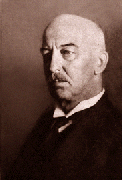
Born: March 17, 1865, Telsze, Russian partition of Polish-Lithuanian Commonwealth (presently Telsiai,Lithuania)
Died: December 16, 1922, Warsaw, Poland
Early days. He was born in the family of a January 1863 insurgent, a land owner. Completed secondary school in Lipawa, Latvia.
Higher education. Affiliation to "Proletariat". Due to his health condition, interrupted his studies at the St. Petersburg University and graduated from the Technical University in Zurich (Switzerland). During studies, was affiliated to the émigré group of the "Proletariat" party, which made it impossible for him to return to the country, where Russian authorities issued a warrant of his arrest.
Professorship in Zurich. He won international recognition as a water-power engineer. In 1908 became a professor at the Technical University in Zurich and later the head of Department. Thanks to his scientific publications and their implementations he was recognized as one of the most outstanding European water-power plant constructors and a superb expert in geology.
Poland related activities. During the First World War, was engaged in charity activity directed to Poland and founded the Polish Committee of Aid to the Victims of the War (so-called Committee Vevey). He gradually became to adhere to the concepts implemented by Jozef Pilsudski. After the war, he returned to Poland in March, 1920 and participated in the Vistula river-bed control project. In June 1920, was nominated Minister for Public Works. Became President of the Academy of Technical Sciences and Chairman of the National Reconstruction Council. In June 1922, was appointed Minister of Foreign Affairs.
Rightist attack on him. Election to Presidency. The rightist press attacked him for his affiliation to Jozef Pilsudski and supporting the policy of the Chief of State, to whom he was related by affinity. Due to a demagogic action of the nationalists (National Democracy), he became the leading personage of the left side of the Sejm. On December 9, thanks to the support of the left, of the center and of the minorities, he was elected first President of the Republic and sworn in on 11 December 1922.
Vicious attacks by the right (National Democracy=ND) lead to murder.After the election he became a target of vicious, slanderous attacks by the right wing parties and in particular by the National Democrats (ND). On 16 December, at the opening of an art exhibition during a conversation with the British Envoy he was shot dead by a rightist extremist and a fanatical supporter of ND, Eligiusz Niewiadomski. The assasin declared at the trial that he first planned to kill the Chief of the State Jozef Pilsudski.
Based on the biography appearing at
President of the Republic of Poland
Copying of this material is unrestricted
See also:
Polonialife
Return to home page:
Prominent Poles